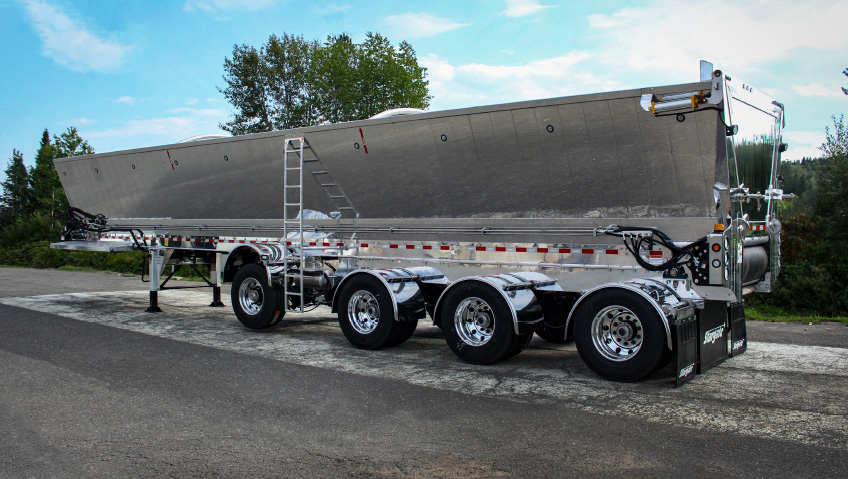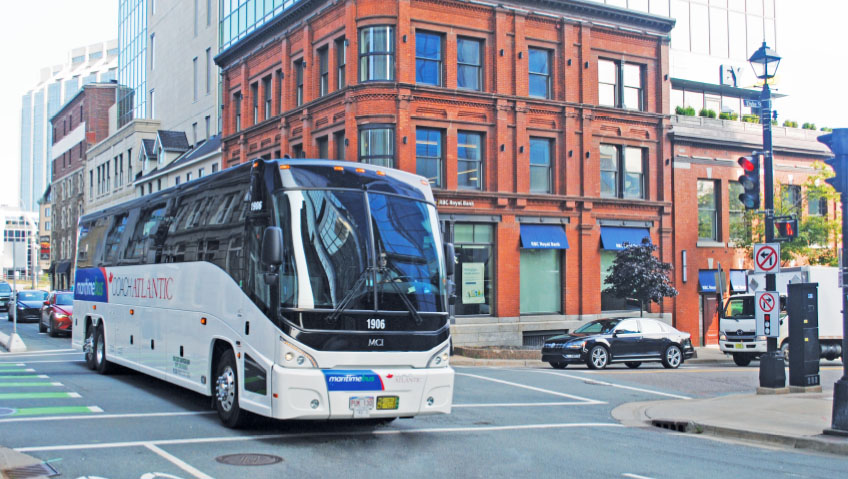As North American business continues to experience a return to domestic manufacturing, transportation becomes all the more vital to maintaining supply chains—and nowhere is that more evident than in trucking.
From tiny Centreville, New Brunswick, with a population of just over 550, one company has established itself as the premier manufacturer of specialty trailers. Now celebrating its fifty-fifth anniversary, BWS Manufacturing is moving forward as one of Atlantic Canada’s most successful enterprises and has an equally successful continent-spanning dealer network.
Like many businesses, BWS sprouted from modest beginnings: a small welding shop begun by Burney MacDougall in 1967 as ‘Burney’s Welding Shop’ to cater to local potato farmers. Potato giant McCain is headquartered just eleven kilometres away, and this proximity fuelled early growth. That growth was further boosted by Burney’s experience in the forestry sector, into which he carved a niche manufacturing trailers for that industry.
As the fledgling company expanded, so too did its varieties of specialized trailers. By 1975, the rebranded firm was manufacturing snow and ice equipment, truck bodies, and final-stage trailers for a variety of sectors. “We started in agriculture and forestry, and fifty-five years later, we cover many market sectors,” sums up Vice President of Sales and Marketing Scott MacRae. The company’s trailers serve the gravel, agriculture, forestry, oil and gas, nuclear, and even consumer products industries. “We’re very diverse.”
A new chapter for the company came in 2017 when it was purchased by Quebec business magnate Hugo St-Cyr. Today, it boasts over 220,000 square feet of production space where every one of its trailers is made, as well as a continental network of over seventy dealer locations across the U.S. and Canada.
MacRae says the industry is experiencing a boom following the pandemic-induced pause in buying, noting that most trailers enjoy a lifecycle of seven to ten years. “With COVID, with the uncertainty in the market, people extended that purchasing cycle to ten to twelve years,” he says.
New purchasing trends have outpaced production, which has shifted MacRae and his colleagues’ focus away from BWS’s fiftieth anniversary. “We have officially sold out of our production for 2023, and we have shown a forty-plus percent increase in our business sales for next year.” MacRae further commented, “So as far as celebrating, we’re just celebrating the increased sales at the moment.”
MacRae estimates the current increase in trucking will continue for several years and dismisses rumours of a recession on the horizon. “Everything you see around you has been on a truck at one point in its life,” he says. “Transportation is always something that is going to be necessary, so it is always going to be there.”
BWS’s trailers are capable of transporting almost any conceivable material, a testament to its in-house engineering and research and development team. Its cutting-edge painting facility is the largest of its kind in eastern Canada. The steel shot blast, epoxy primer, industrial topcoat and baked finish process guarantee maximum product durability and finish on all BWS trailers.
Finally, many of the company’s senior employees have previous heavy equipment operating experience, giving them the ability to put themselves in customers’ shoes and give a superior product experience.
BWS is now offering the new practice of zinc coated galvanizing as an option to most models of its trailers—an expensive procedure, but necessary in the harsh winter environments of Canada and the northern U.S.
BWS trailers are designed to be dipped into a molten zinc finish at 845 degrees Fahrenheit. “As the trailer is dipped in it, the zinc actually permeates the steel, which gives it a secure coating,” MacRae says.
The results speak for themselves. “You’ve now taken a trailer that typically, with a painted finish, you would get a good solid ten years out of,” says MacRae. “With a zinc finish, we’re seeing twenty-plus years. The return on investment far outweighs the cost in the beginning.”
Admittedly, the process does require each trailer to be designed to accommodate the unique properties of the zinc treatment. The entire process adds a day to the trailer assembly, but the company is adamant that the added benefits far outweigh the cost.
In addition to its extensive product line, BWS maintains a close working relationship with its dealer network across the continent. Trained product specialists visit dealers regularly, ensuring sales professionals—and therefore customers—have comprehensive and accurate information on the company’s products. “We have to ensure that they have the start-to-finish and follow-up of a complete sale package,” he says. The goal is to ensure that customers know everything possible about their new trailer before they leave the dealership.
To ensure consistent quality, the company also sends surveys to end users every six months, collecting data on how both it and its dealers can improve. The result is an annual dealer review, during which the information is filtered back network-wide, identifying both successful practices and those which can be improved.
Every BWS dealer is responsible for warranties, so any of the company’s trailers can be driven to one of those dealers and receive repairs. “We can honestly say we have a warranty network, from coast to coast, in Canada and throughout the U.S. as well,” MacRae says proudly.
In addition to its product line, it maintains a close working relationship with its affiliated company, Stargate Trailers in Ontario. The relationship is relatively new, having begun in 2020 when Hugo St-Cyr purchased Stargate, but the two companies have a naturally complementary relationship. “BWS is an all-steel manufacturing company; Stargate is all-aluminum,” MacRae explains, and this allows BWS to be the yin to Stargate’s yang.
The two companies’ similar business models have also enabled them to work together on their outreach as well. “We have a great overlap in our dealer network as well,” he says, “so that’s actually increased our footprint.”
As part of BWS’s and Stargate’s working relationship, the companies enjoy significant reciprocity in parts; many are interchangeable across models, helping to streamline logistics. The two have also combined their purchasing teams, allowing them to buy better and smarter. The production teams of both companies also work closely together, taking the best practices from both companies.
A prime example of the collaboration between the two comes with BWS’s pony trailers, which are designed to be towed by dump trucks. The trailers’ long central pole assembly and chassis would be made with BWS steel; these are then shipped to Stargate, which will complete the trailers with aluminum.
As with so many businesses in the pandemic and post-pandemic eras, BWS is naturally expanding its supplier network, though it is fortunate to have developed long-term relationships with its suppliers over the years. To MacRae, it is a question of balancing costs and quality.
“We’re creating new relationships, and we are endeavouring to look at any opportunity that is possible and makes sense, without compromising the quality of our product,” he says. With BWS having built a reputation over decades, it must avoid the siren song of cheaper, imported parts. “Our brands are synonymous with quality, and we have to ensure that we maintain that brand.”
To continue its business flexibility, the company is also expanding its workforce from an unexpected source. After growing tired of attempting to recruit with little to show for it, it sent a human resources representative to the Philippines, where she has recruited approximately forty-five skilled workers who are currently en route to Canada. “We just got tired of waiting and decided to take it into our own hands, and it’s a great opportunity for us, it’s a great opportunity for the immigrants,” MacRae says. “We are growing beyond our BWS and Stargate family.”
As it looks to the future, BWS is also experimenting with emerging technologies such as artificial intelligence (AI) and robotics and how they may be integrated into its business model. Yet while the company sees itself as forward-thinking, MacRae is quick to point out that the company is not out to eliminate jobs. “We’re not looking at robotics or AI systems to replace our workers, only to complement who we have here now,” he says. “Our business is here because of our people. We are here because of the people that work with us and for us.”
With over half a century of experience and a bright future in transcontinental transportation before it, BWS is an exemplary member of Atlantic Canada’s manufacturing economy. Thanks to long experience, a dedicated staff, superior customer service, and an eye toward the future, it will continue its cycle of steady growth. “Our mission is to be the number-one specialty trailer manufacturer in North America,” MacRae says, “and we will get there.”






